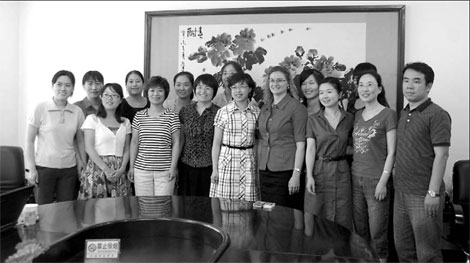Society
Class acts
Updated: 2011-07-28 08:02
By Guo Shuhan (China Daily)
|
Michelle Shearer, 2011's National Teacher of the Year in the United States, poses with Chinese teachers during her trip in China. Provided to China Daily |
This year's National Teacher of the Year from the United States finds out on her maiden visit to the country that educators on both sides have similar goals. Guo Shuhan reports.
When Michelle Shearer shared the concerns of her fellow teachers in the United States with her Chinese counterparts, she realized that they were working toward the same goal - "to make sure students are able to more than just answer papers and are equipped with the skills they need to succeed in life".
The chemistry teacher from Urbana High School in Urbana, Illinois, stood out from more than 5 million public school teachers to be voted 2011's National Teacher of the Year.
Besides being an advocate of students, teachers and public education in her own country, Shearer seeks to enhance educational communication with other countries.
In late June, she visited four schools in Beijing and in Xi'an, Shaanxi province, making her the first National Teacher from the US to visit China.
"If teachers want to be able to bring the world to their students, they need to understand the world first," says Scott Barnes Cocking, senior director of the society for global citizens of People to People Ambassador Programs, which sponsored Shearer's trip and has offered many other Sino-US exchange programs for students and educators.
"We think this trip (to China) will expand not only Shearer's horizon but also that of her students and colleagues, when she brings back what she sees and learns to her classroom and school."
During her trip, Shearer had talks with chemistry teachers at Beijing Bayi High School and Xi'an Fulun High School. They discussed the practical problems teachers face in both countries, such as adopting innovative teaching methods to enhance students' interest in learning.
Addressing prospective teachers at Capital Normal University, she said she retained her passion for such a "challenging and exhausting but rewarding" profession as teaching after 14 years.
Her visit also gave her an idea of China's vocational education through visits to the classrooms of hotel management students at Beijing Foreign Affairs School.
"People in America perceive Chinese students as high-performing, who do very well in tests. When I chat with teachers here, I realize that all that is true but (there is) so much more," says Shearer, who had not visited China before.
"I've also learned that teachers here are very interested in trying to bring creative learning to the classroom, and that they want to move beyond just test scores and bring a broad learning experience to their students. We share the same goals."
Meanwhile, Shearer's introduction of the creative teaching methods used in US classrooms, which are structured around student ability, left a deep impression on her Chinese counterparts.
"I'm a little envious of Shearer's students, who have opportunities to design and carry out their own experiments early in high school. Here, even at the university level, we must follow the instructor while doing experiments, for the first three semesters," says Chen Hao, a student of biotechnology at Capital Normal University.
Song Xiaomin, a chemistry teacher at Beijing Bayi High School, says Chinese teachers are used to detailing everything for their students.
Song says students should be allowed to explore beyond what the textbooks prescribe, even if their experiments do not always lead to the right conclusions.
"If we want to change the 'made in China' tag to 'created in China', we need to start from school, to foster a new generation of curious and original minds," Song says.
Shearer sees her trip as an opportunity to look beyond her culture and see what is going on in other countries, although she accepts the short visit is barely enough to scratch the surface of each other's educational concepts and methods.
She argues for the establishment of an educational panel where teachers from both countries can participate, saying this will bring out the differences and similarities in the two approaches and stimulate discussion.
She says the time she has spent in China has left her wanting to know more. She hopes to come back with her husband, who is a high school teacher in physics, to visit more schools and interact with the students, to gain a deeper understanding of the nature of Chinese education. She also wants to know more about education in rural areas.
"The influence of China on the global scene is huge, in technology, economy and education, and so forth. So it's important we understand each other," says Jon Quam, director of the National Teacher of the Year Program, who hopes to bring a larger group of teachers to China soon.
"Learning from one another is not easy, it takes time. We have started the conversation, and it will continue and generate more exchanges."

Specials

Turning up the heat
Traditional Chinese medicine using moxa, or mugwort herb, is once again becoming fashionable

Ciao, Yao
Yao Ming announced his retirement from basketball, staging an emotional end to a glorious career.

Financial sector short of talent
Lack of skilled professionals in Shanghai inhibiting the city's development as a financial hub
